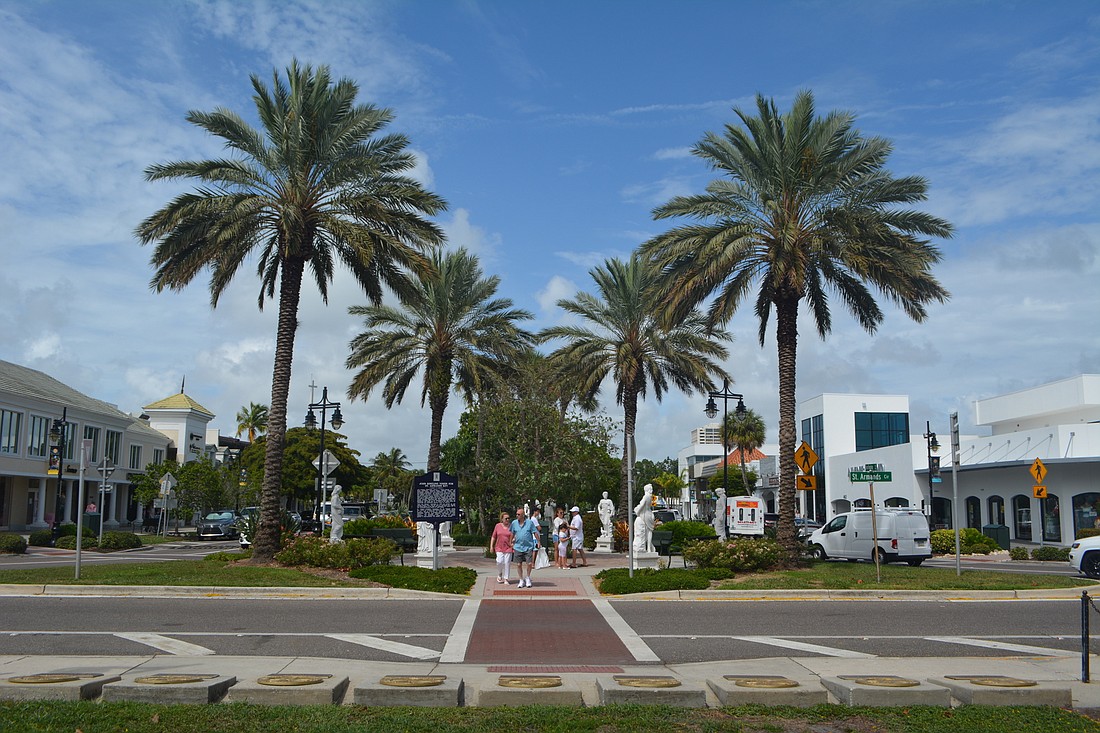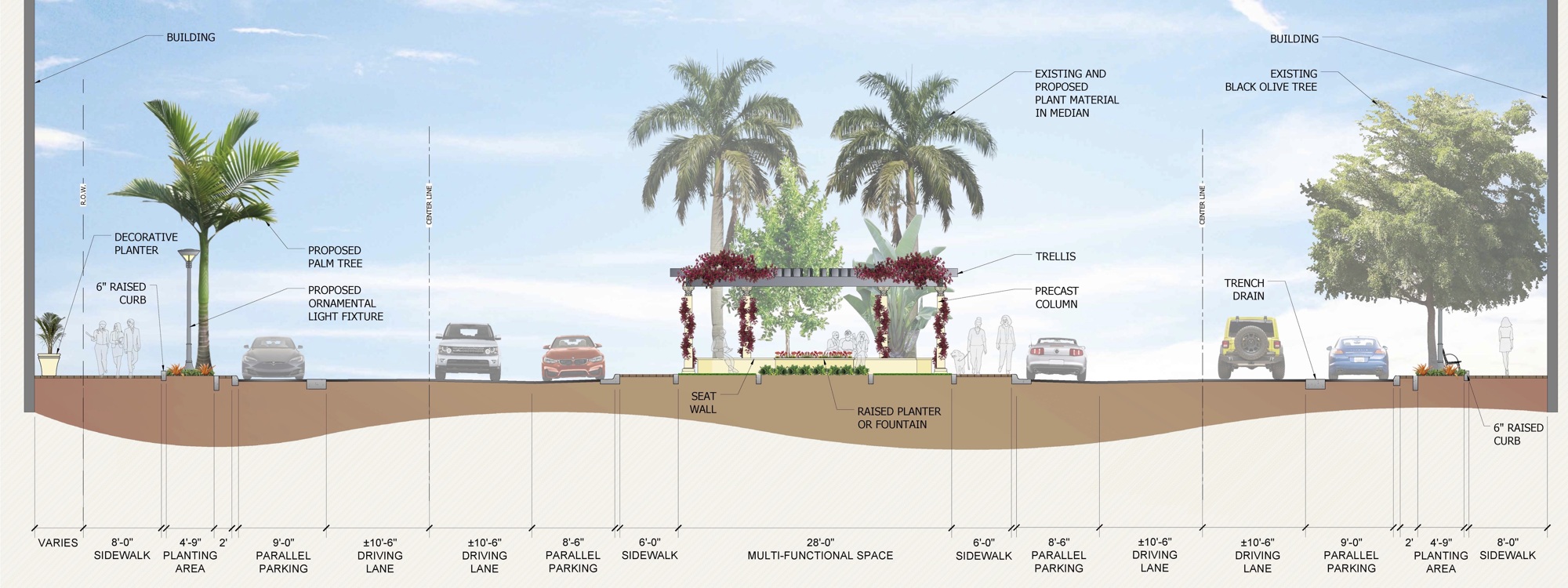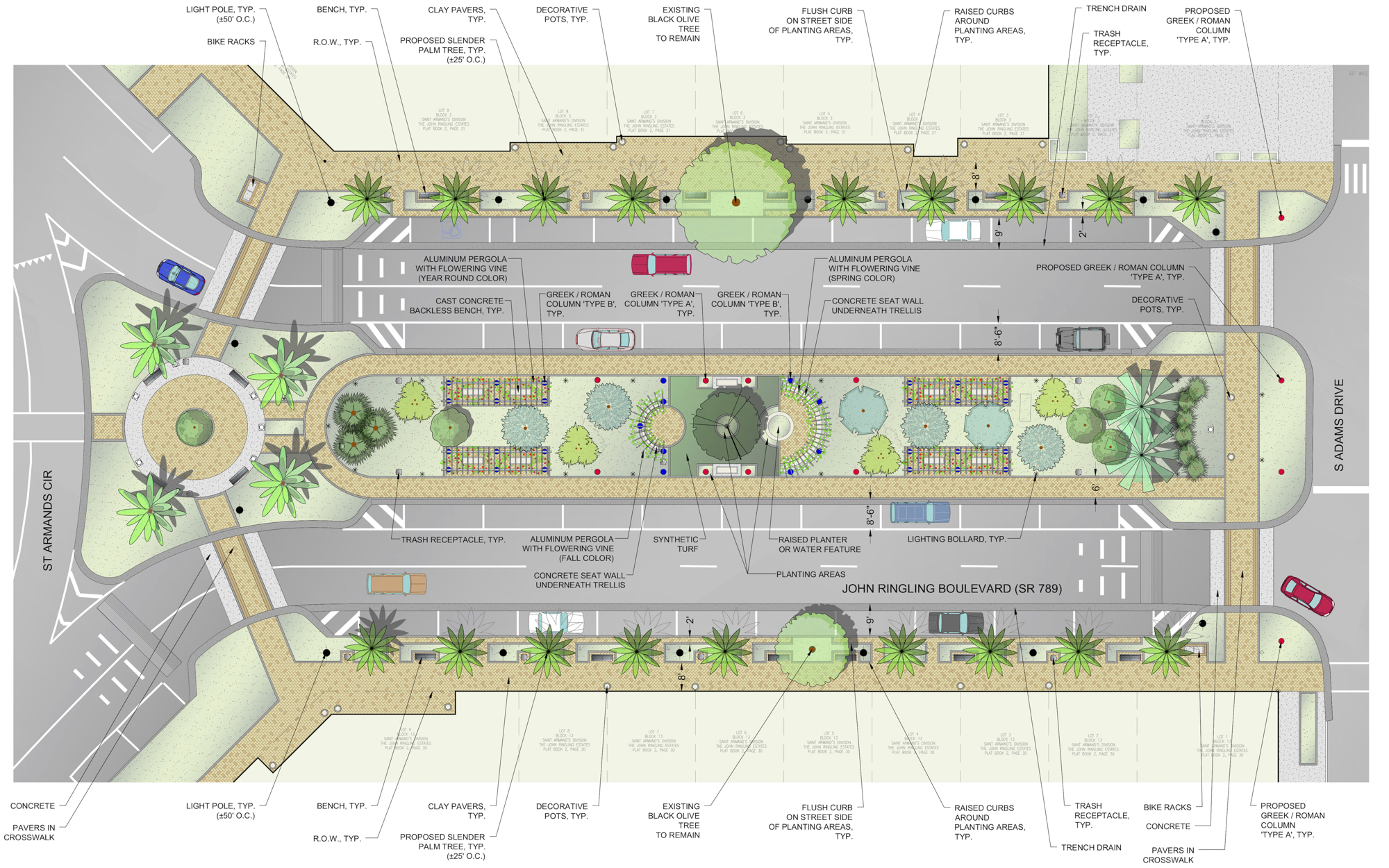- January 15, 2025
-
-
Loading

Loading

At this month’s meeting of the St. Armands Business Improvement District, board members offered praise for a concept that reimagined the streets of the Circle with new lighting, landscaping and furniture in a quest to create a more unified district.
By the end of its conversation, board members agreed to move forward with the plans in hopes of eventually making a St. Armands streetscape-improvement project a reality. To get to that point, the BID intends to refine the initial concept to better reflect its desires in consultation with other stakeholders. At least two of those stakeholders — the city of Sarasota and the Florida Department of Transportation — will need to formally approve plans to make alterations to public property.
Along the way, the group of property owners will also have to secure somewhere in the neighborhood of $10 million, according to preliminary cost estimates.

Although board Chair Geoffrey Michel said the concept plan represented an initial step down what could be a long path, BID board members were enthusiastic about the proposal presented this month — and about the potential effects streetscape upgrades could have on the Circle.
“I’m absolutely blown away,” board member Tom Leonard said. “For your first attempt, just coming out of the gate with something like this is great. It’s solving a lot of problems.”
Since October, the BID has been engaged in a conversation about streetscape design as a tool to increase activity and improve the aesthetics of the Circle.
Initially, those conversations revolved around amenities to public spaces on St. Armands. Working with Dan Lear of DSDG Architects, the BID discussed options for creating a parklet in one of the medians on the Circle, adding seating and other features, such as an oversized chess set. The conversation began in parallel with other options for adjusting the look of the district, including new zoning and changes to St. Armands Circle Park.
In March, the group selected Phil Smith, a landscape architect with David W. Johnston Associates, to produce a concept design for completely making over one street segment leading into the Circle. BID board members suggested a comprehensive plan for redesigning a block could give the city and developers a route toward a harmonious design standard.
Smith’s proposal sought to do that, leaning on landscaping, lighting, signs, street furniture and more to create consistent visual features across the Circle.
“St. Armands really has a sense of place, and what you want to do is enhance that sense of place and make it feel more special,” he said.
Smith focused on the block of John Ringling Boulevard between Adams Drive and St. Armands Circle, the road leading into the Circle for those approaching from the mainland. In total, Smith said the changes in his initial design would cost $2.5 million, though the improvements could be phased in if the group desired.

Smith emphasized the opportunity to make that particular street segment a defined entry point, proposing the vertical columns to denote the gateway into the St. Armands district.
City Planning Director Steve Cover said it was understandable why St. Armands property owners were interested in streetscape changes because of inconsistent paving and landscaping in the area. He applauded the BID’s proactive approach to pursuing improvements, calling it a visionary group. Still, he noted any plans would need support from the City Commission, and any changes to state-controlled John Ringling Boulevard would require FDOT involvement, too.
Cover said there are other complicating factors that must be sorted out before any project can move forward. St. Armands Circle is a hub for pedestrian and vehicular activity, and streets leading into the Circle serve as Sarasota’s only points of access to Lido Key and Longboat Key. As a result, the city would have to be more considerate about the disruptions associated with construction than they usually would for a streetscape improvement.
“It would be great to upgrade everything out there, but there’s a lot to take into consideration for sure,” Cover said.
One other thing Cover said must be taken into consideration: cost.
Extrapolating the $2.5 million price tag for one spur of the Circle, the BID could be looking at $10 million to improve the entirety of the district. Smith said that price could conceivably come down if all of the changes were implemented at the same time, but Cover said it could go up if the plans also incorporated the interior of the Circle.
Either way, Cover said it was a hefty price tag for a major project.
“That becomes the big issue: Where does that money come from?” Cover said.
BID Operations Manager Brandy Smith said the BID had made a budget request to the city for $700,000 in capital improvement funding toward a first phase of a streetscape improvement project, but that proposal came before Smith presented his $2.5 million estimate. In addition to seeking city support, the BID originally envisioned contributing $200,000 of its own funding and requesting an additional $100,00 from FDOT.
BID board members offered their thoughts on how to best move from concept to reality. Michel said the city could work to establish design standards that a builder would be required to adhere to if they redeveloped their property. Over time, Michel said, the look of the district would become complementary rather than incongruous.
“Our goal is to not have too much more happen on the developer side that would be piecemeal to this,” Michel said.
Other board members looked to the city as a potential source of financial support. Cover said the City Commission had the authority to evaluate the level of priority a St. Armands streetscape project would receive, slotting it into a long-term capital improvement plan accordingly. The BID discussed the city’s role in funding downtown improvement projects, including $3.5 million to upgrade Lemon Avenue and Paul Thorpe Park in 2019. Multiple board members said they believed it would be appropriate for the city to offer similar support for a St. Armands project.
“We’re also part of the city,” board member Yvonne Schloss said.
Michel said the group would ultimately need to rely on a mixture of sources to help pay for the type of upgrades the BID is envisioning.
“The funding’s going to come from numerous places,” Michel said. “Nobody’s going to write the check for $10 million.”